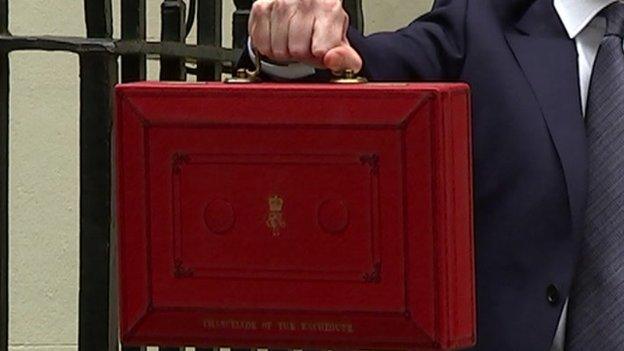Budget 2015 analysis: Stealing Labour's clothes
- Published
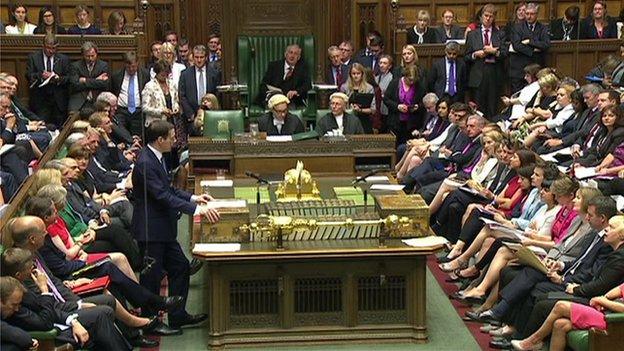
It was the first fully-fledged Conservative Budget for nearly two decades, and one that was as deeply political as it was fiscal.
Although the speech lasted little more than an hour, it was substantial in its scope.
Channelling former Conservative Prime Minister Margaret Thatcher, George Osborne said "there will be no turning back".
But in some key respects, it was Labour's clothes he stole.
Picking up the mantle of 'One Nation' - appropriated but then arguably discarded by former Labour leader Ed Miliband - the centre point of Mr Osborne's speech was to take a key opposition policy, then enhance it.
So there would not just be incentives for employers to pay a Living Wage, it would become compulsory for them to do so. "Britain deserves a pay rise", said the chancellor.
Work and Pensions Secretary Iain Duncan Smith almost burst a blood vessel as he cheered enthusiastically, delighted that Mr Osborne had now apparently symbolised his message that it pays to work.
And Mr Osborne expropriated even more policies from his opponents, such as abolishing "non-dom" status for wealthy residents who had lived here for 15 of the past 20 years.
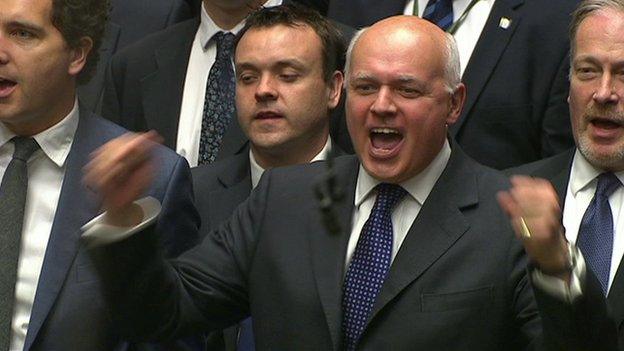
Mr Duncan Smith could not hide his delight at the living wage announcement
All of this was designed to bolster his narrative that the Conservatives would help working people rather than just the wealthy.
So he made his tax priorities clear.
No cut yet in the 45p rate of tax which is paid on earnings above £150,000. With a ComRes poll for the Daily Mail suggesting 57% of Conservative voters would oppose this, it wasn't a difficult decision to reach.
Those high earners will see their pension tax relief cut too, and tax avoiders will also be targeted. More low income wage earners will be taken out of tax all together, too.
But in other areas he pushed ahead with measures designed to highlight divisions with the leaderless Labour Party - including a cut in corporation tax to 18% by 2020, while imposing further pay restraint on public sector employees.
The chancellor knows that three of the four candidates who hope to lead the opposition have talked a lot about "aspiration", following criticism - especially from 'Blairites' - that Ed Miliband was obsessed with those at the top of society, whom he wanted to tax, and those at the bottom - while forgetting all about "the squeezed middle".
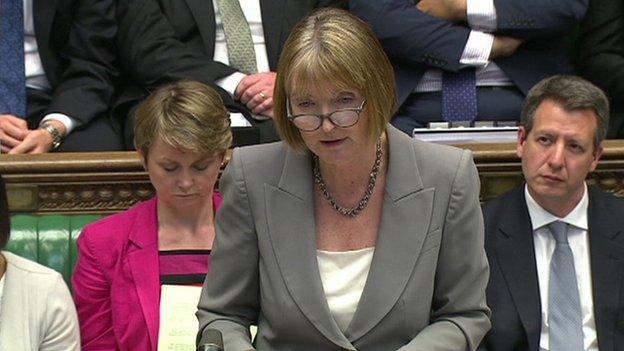
Ms Harman said families would still suffer despite the new national living wage
So Mr Osborne helped some of those higher up the income scale - but who might be, especially in the south, struggling with high mortgage payments and may not be feeling desperately well off - by raising the threshold at which the 40p rate of tax is levied and taking 130,000 people out of that tax band entirely.
And there would be more help with child care costs pretty much across the board, he said.
More controversially, Mr Osborne kept the promise he made in opposition to take family homes worth up to £1m out of inheritance tax. Its a measure which polls suggest divides opinion largely along party lines, with Conservatives supporting it and Labour voters opposed.
But on welfare reform in particular, Ms Harman argued that the chancellor's actions did not match his rhetoric on helping working families.
While Mr Osborne eased the impact of his substantial cuts in welfare often by aiming them only at future recipients, it is clear that lower incomes families who have a third child from 2017 will get less help from the state than they would now.
And would the prospect of future benefit cuts dissuade some people from coming off welfare to take temporary work now if that would expose them to a less generous system in a couple of years time?
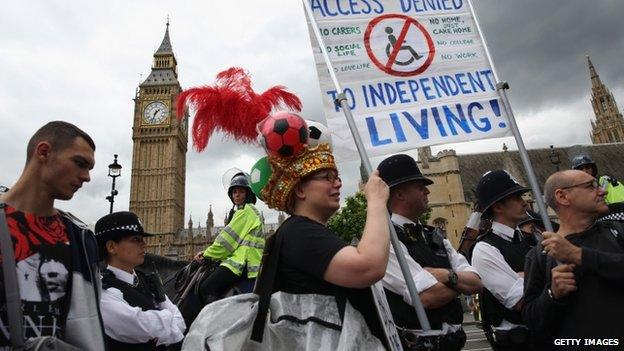
Anti-austerity protestors demonstrated outside Parliament as Mr Osborne delivered his Budget
As Downing Street in particular is keen to demonstrate that the gains of a "lower tax, lower welfare society" can be carried out without too much pain, the chancellor acknowledged that the full £12bn of savings in the welfare budget will not be fully realised until the last year of the parliament.
Some senior Conservatives are privately worried that the cuts will be spread over a number of years - and wanted him deliver a short, sharp shock early on in the parliament.
With one poll today suggesting nearly six out of 10 voters - and more than four out of 10 Conservatives - oppose the scale of welfare reform, it is unsurprising that the prime minister is willing to compromise on the timescale if not the scope.
Before the reductions are fully realised, the chancellor will want to point to higher rates of employment and he also knows higher productivity should lead to higher pay.
So he announced higher allowances for investment, and a new fund to build more roads in England - as well as a levy to boost apprenticeships and improve workforce skills.
That was the good news. Some of the bad news is yet to come.

The government has come under pressure to commit to spending 2% of GDP on defence
With his announcement that Britain would meet its Nato commitment to spend 2% of national income on defence, in effect the Ministry of Defence becomes a "protected department" - just like health and international development. So he is likely to announce deeper-than-expected cuts in other areas in his autumn statement in November.
Amid some relatively rosy forecasts, in the short term economic growth has been revised downwards.
So the chancellor admitted it would take slightly longer to achieve a budget surplus than he anticipated at the time of the election.
Nonetheless, the transformation of the Greek drama in to a crisis has given him plenty of cover for arguing that it in principle there should be a surplus in the "good times".
And where he led, a shell-shocked Labour frontbench followed - though Harriet Harman said she would look at the detail of turning this aim into a legally-binding commitment.
Labour's interim leader also accused Mr Osborne of being more interested in politics than economics.
But it was always his intention - during Labour's leadership hiatus - to make the political weather, so he probably took her criticism as a compliment.
- Published8 July 2015
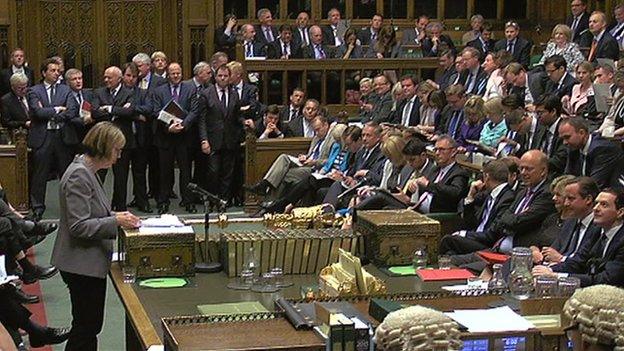
- Published8 July 2015
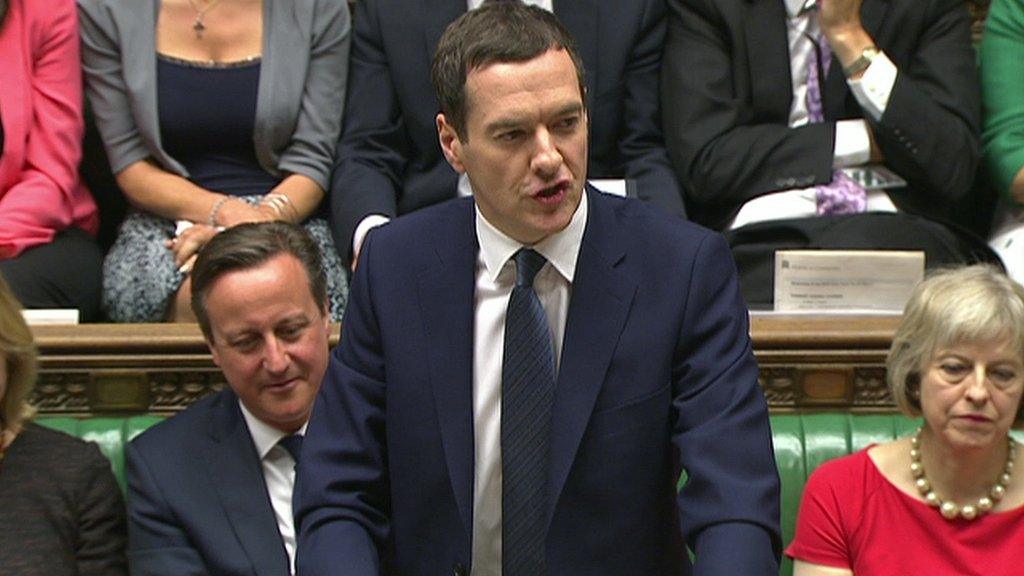
- Published8 July 2015
